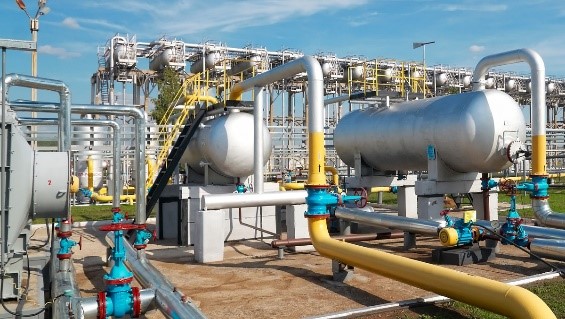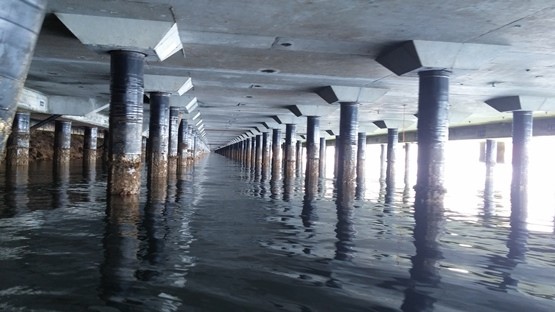

Offshore structures comprise fixed and Floating platforms, mobile rigs, sub-sea pipelines, Mooring buoys, harbors, Wind Farm, offshore jackets And jetties etc. All categories need cathodic protection to prevent the steel from corroding in seawater.
Industrial cathodic protection involves structures such as underground and aboveground storage tanks, buried pipelines, oil well casings and structures associated with refineries, power plants, water treatment, desalination plants etc.
Aries are into corrosion surveys, potential mapping, corrosion rate surveys, design and specification services, materials supply, installation, commissioning and maintenance of cathodic protection systems for steel reinforced concrete structures. These services can be successfully implemented on a wide range of structures such as power plants, seawater cooling systems, bridges, docks etc.
Cathodic protection of marine structures is the most common electrochemical technique used to prevent external corrosion and extend equipment life. Aries can provide inspection and maintenance services to vessels docking in major ports and repair yards. In addition, we also provide spare parts for all types of impressed current and anti-fouling systems and design and supply sacrificial anodes for vessels ranging from tugs to tankers.
Every pipeline operator must carry out regular measurements of CP, be it manually or with the aid of a Cathodic Protection Monitoring System – measurements are taken at rectifiers or solar stations and CP tests points in an Impressed Current Cathodic Protection (ICCP) system and sacrificial anodes (in galvanic systems).
Aries are into corrosion surveys, potential mapping, corrosion rate surveys, design and specification services, materials supply, installation, commissioning and maintenance of cathodic protection systems for steel reinforced concrete structures. These services can be successfully implemented on a wide range of structures such as power plants, seawater cooling systems, bridges, docks etc.
CIPS or CIS (Close Interval Survey), is an above-ground, non-intrusive survey, which is used to accurately determine the effectiveness of a cathodic protection system along the entire buried or immersed pipeline route.
DCVG is a survey technique used for assessing the effectiveness of corrosion protection on buried steel structures. In particular, oil and natural gas pipelines are routinely monitored using this technique to help locate coating faults and highlight deficiencies in their cathodic protection strategies.
The PCM (Pipeline Current Mapping) survey is performed to qualitatively rank coating quality and highlight pipeline locations with the most significant coating holiday defects. PCM (Pipeline Current Mapping) works by applying a very low-frequency alternating current (AC) to the pipeline by a PCM transmitter.
The sulfate-reducing bacteria (SRB) test is a small vial containing a culture gel that turns black if sulfites are present in the test sample. Sulfites are produced when sulfates are reduced by bacteria. The amount of color change can be compared with the included chart to help determine the level of contamination.
Stress concentration tomography (SCT) is a non-invasive, non-destructive pipeline inspection survey based on Stress Concentration Tomography technology. It is utilized to report the presence of all defects in any orientation causing stress magnetization in the pipeline wall, including corrosion and cracks, etc.
The drop cell survey is performed from the surface and requires that a reference electrode is lowered through the water column adjacent to the platform structure. Readings are recorded at predetermined depth intervals at various locations around the structure. This method is quick and inexpensive, it will give some indication of the surface potential of the structure
The device to be used for locating buried pipelines and cables before leakage detection or construction of pipelines
Aries engineers can support FEED studies and consultancy services on major projects. These include pipelines, well casings, tank farms and corrosion assessment of reinforced concrete structures etc
Aries can provide detailed audits of cathodic protection systems, interference investigations or pipeline integrity assessment surveys. For pipelines, a complete Coating Defect Assessment Survey may include a Close Interval Potential Survey (CIPS), Direct Current Voltage Gradient Survey (DCVGS), PCM survey, soil resistivity and soil analysis to provide defect priority ranking and earmark selective coating defects for excavation and rehabilitation. We follow External Corrosion Direct Assessment (ECDA) procedures as set out in current NACE standards.
Aries have a wide range of products used in cathodic protection. We also have supply agreements with many specialist suppliers which enable us to offer a complete range of cathodic protection materials and associated products.